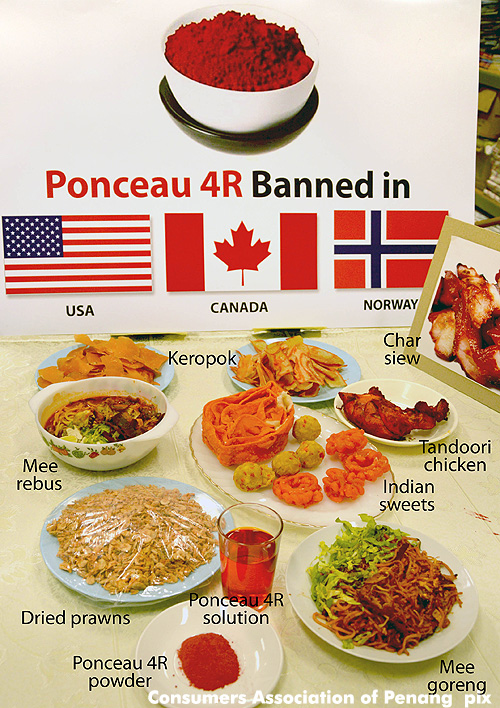The Consumers Association of Penang (CAP) urges the Health Ministry to ban Ponceau 4R.
The reddish-orange dye is known to cause cancer, allergic reactions and asthma. Presently it is banned in Canada, Norway and United States. Ponceau 4R is an azo dye which is produced from petroleum products.
In our latest test we found five samples of dried prawns, two samples of fish crackers and one sample of char siew (barbecued pork) containing Ponceau 4R. The samples were bought in Penang, Kedah and Perlis. The char siew sample was bought in Penang.
 In our earlier tests we found the dye to be used in turmeric and curry powder. The dye was also used to adulterate tea.
In our earlier tests we found the dye to be used in turmeric and curry powder. The dye was also used to adulterate tea.
The orange red colour induced from the dye is extensively used in a variety of hawker’s food such as mee rebus gravy, pasembor gravy, prawn fritters, and tandoori chicken. Fish and chicken are rubbed with this dye before frying resulting in the reddish colour which gives the impression that it is marinated with spices such as the very expensive saffron.
Makers of Indian sweets such as laddu and jelabi frequently used this dye to colour them.
Hawkers and food producers use dyes in food to deceive consumers into believing that good and nutritious ingredients are being used but in reality the food have been coloured with harmful dyes. Colouring does not enhance the flavour and taste of the food, it is added purely to deceive consumers at the expense of their health.
In view of the dangers of Ponceau 4R, the Consumers Association of Penang urges the Health Ministry to take the following actions:
- Remove Ponceau 4R from the list of approved dyes in the Food Regulations 1985,
- Investigate and prosecute any person found using dyes in food items which the law does not allow to be coloured. (Foods like tea, spices and dried prawns),
- Discourage food operators and manufacturers from using chemical dyes since they are dangerous and totally unnecessary,
- Conduct a media campaign to discourage consumers from purchasing food item that contain dyes and educate them on how to read food labels properly,
- Conduct regular tests frequently on all food items sold to ensure that it is free from banned dyes and toxic chemicals.
The Health Ministry should seize all such food products in the market. Meanwhile, consumers are advised to avoid food which looks unnaturally bright.
SM MOHAMED IDRIS is president, Consumers Association of Penang (CAP).

